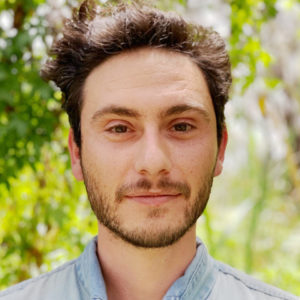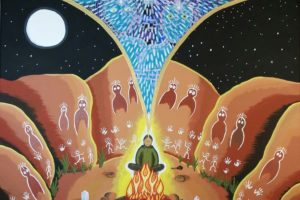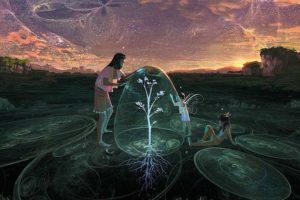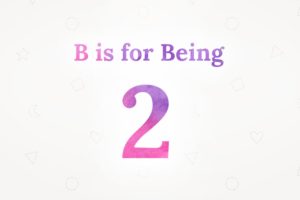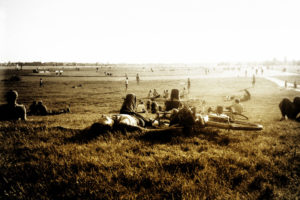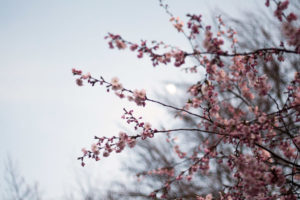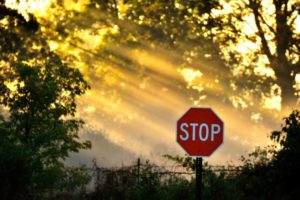A Tool for Unblocking Our Creative Flow.

This is Part 2 of my talk with Luna. Here’s Part 1 of our talk if you missed it.
The Artist’s Way, written by Julia Cameron, is a well known tool for understanding and clearing the blocks which hold us back from knowing and expressing our creativity.
In this episode, we go deep into the tools which The Artist’s Way provides and share our own experiences of going through the course and the continued use of the tools well after completing the 12-week course.
I began my Artist’s Way Journey at the end of 2012. I had just finished my degree in Film and was at a dead end creatively. I had so many film ideas and wasn’t working on a single one of them. I would procrastinate big time and do anything not to work on them even though I wanted to! Sounds crazy right?
I knew my creative expression was blocked and that I was afraid of making a film which no one liked or making a film in the wrong way, but I didn’t know why I was feeling this way.
My mum had a copy of The Artist’s Way and I would often find it laying around the house and flip through and read the inspiring quotes.
Overtime I began procrastinating in more and more elaborate ways and still wasn’t feeling free to create. I wanted to understand why I was so scared of making a film. It was around this time that The Artist’s Way came up in conversation with a friend and we decided to start the 12-week journey together.
I completed the course in early 2013 and found it helped me uncover some answers to why I was experiencing such a high degree of creative-blockedness. The tools it provided were invaluable and I highly recommend the Book to anyone seeking to understand and reconnect with their creative expression.
Highlights and Takeaways
- Sharing your work regularly makes it easier to take action on the creative urges you have.
- The outcome is irrelevant, it’s the creation that matters.
- You can discover what you want to express creatively by asking yourself, what experiences have I had? and which of these experiences do I want to share with others?
- Using free-form writing we can re-connect with our creative urges and identify the things we are doing which don’t feel good for us.
- Asking yourself, with genuine care and curiosity, what it is you’d like to be doing now, strengthens your connection with your creative voice.
- Creativity is infused into life. There’s no way for you not to be creative.
Show Notes
What is The Artist’s Way? [06:20]
- Luna: The Artist’s Way is a 12-week program (in a book) that is about uncovering your creative capabilities and creative style; and uncovering the heart of who you are.
- There a two consistent practices featured in the book: The Morning Pages – which is writing three pages of free flow writing as soon as you wake up, and Artist’s Dates – where you go and do something that inspires you once a week.
- Ben: Artist’s Dates are really fun.
- Luna: Those are so fun, and also really challenging to make yourself go to sometimes. That’s one of the most interesting things in The Artist’s Way process is watching where you resist stuff. It’s so interesting to watch yourself resist doing certain tasks because some of the tasks feel so uncomfortable because you have to uncover things and tell yourself the truth about things, and that can be very hard. We’re so good at distracting ourselves from those kinds of things.
- Julia Cameron talks at the beginning of the book about the Morning Pages being just for the writing and not for the thinking about or reviewing. That was a really hard thing for me to learn that it was ok to whinge about things or not like stuff. It’s a hard thing for me to allow myself to express the less attractive emotions.
- Ben: For me it was a little bit different, I felt that what I was writing had to be professional and sound like it had come straight from a movie script or a best-selling novel. And in doing that I tripped myself and just stagnate.
Luna: You never open with The Great Work, you have to work your way up to it.
- Luna: You have to create a lot of terrible art. In order to get to great poems I have to write a lot of bad poems; and that’s the way it’s been for everybody in every practice but it’s so hard to give yourself the permission to make the bad art. Because you know your capable of the good art, you’ve got the good ideas but you just haven’t progressed enough through the process and the only way to get to that place is by making the bad art.
- Ben: It’s not like you sit down and say “Cool, I’m going to make this shit now.” You’re just sitting down and allowing yourself to express whatever is inside you with the skills and awareness that you have.
Sharing Your Work Regularly [10:36]
- Luna: Every time you write something new, every time you make the next thing, all of a sudden that becomes the absolute bottom line, that becomes the very least you can do and all of a sudden all your work before that looks really sub-par.
- It’s very tricky, especially when you’re sharing stuff, I found that one of the challenges was sharing regularly enough that you don’t hold back because it’s been to long. If you leave something too long all of a sudden you think it’s embarrassing or shameful, when it was the very best thing you could do two months ago. It might have taken you four years to make that thing, but if you don’t share it straight away, six months or a years time it will be embarrassing and it will just sit on a shelf and nobody will ever see it.
- Ben: I’ve done that so much. I think the main thing which kept me in that cycle was the thought that it has to be perfect or the best.
- Luna: It’s so painful to be in that space. You’re placing these expectations on your work to meet some kind of standard. But that’s heading in the wrong direction: in order to make something really fucking fabulous you have to be really vulnerable and totally honest; not really thinking about whether it’s going to turn into the most powerful thing you’ve done; whether it will be the work that in twenty years time people will say, “yeah but did you see his [title of fabulous work].” The only way to create that work is to be right in it.
- You have a life time, you have a whole body of work. We are unpredictable, complex creatures. It’s unrealistic for us to consider that we’re going to have a nice, well put together body of work that suggests one particular tone or style.
- If you look at painter’s through any period, they develop and their styles change significantly decade to decade.
- Ben: We’re stepping outside of the moment every time we think, “Yeah, I’m making this thing BUT is it like the work of the people I admire? Is it consistent with my previous work.” Every time we project ourselves into the past or into the future we are taking ourselves out of the present moment and as soon as we do that we’re less intimately connected with the creative flow.
- Luna: That’s what I’m talking about when I say, bad art. When I say bad art, I’m talking about **creating work without any attachment.
Luna: It’s just about the making, it’s not about the outcome.
- There’s nothing as satisfying as making a bunch of stuff and putting it in the bin because it’s rubbish. Because it reminds you that the outcome is irrelevant, it’s the creation that matters. It’s about feeling it, making it – who cares what happens afterwards.
Discovering Your Creative Voice [15:28]
- Luna: I think it really helps to be looking at what it is you have to say, what it is that really matters to you personally. What is the complex and unique creature that you are with your experiences? What have you experienced? And what do you personally have to say from that experience? That’s where the real gold comes from. It’s the value of what you actually have to say that nobody else can say.
- Everybody thinks the things they have to say are mundane even when their experience is living in an exotic jungle or living on a boat on the Seine in Paris, everyone thinks what they do is completely normal.
- Everything is of inherent value and every story is equally important. And it all has to be said. That’s why we have the urge to create.
Writing Our Way to Flow: The Morning Pages [17:48]
- Ben: The Morning Pages are a tool we can use to just express and make – not for the outcome – it’s just tuning into that moment and writing writing writing. I feel that is what the Morning Pages is all about.
- Luna: We can also use it to empty all of our ‘stuff’ out. We build up so much stuff just in the course of a day. There’s so much waffle going on in the head; a lot of this stuff is subconscious and you don’t notice it until it’s on the page.
- When we are out of practice of: having a feeling and taking action on that feeling it feels much harder to take that action, but when you’re in the flow of taking action regularly on your feelings it becomes much easier.
- When people first start doing the Morning Pages it can feel like really difficult. It can be really hard to write 3 pages. But every time you do get to 3 pages it feels amazing. After a while you start looking forward to the Morning Pages as way to get it all out. And the more you get in the flow of writing the easier it is to keep taking action on your creative impulse.
- The volume of your creative impulse gets louder and louder the more you listen to it.
- Ben: Expressing yourself through writing you begin to notice themes in your creative expression.
- Luna: Through the writing process I noticed how many things I was doing that I just wasn’t interested in; the social events I was going to which were giving me nothing. I saw a pattern of not asking myself what I need in this moment.
The Artist Date [22:09]
- Ben: An Artist Date requires you to tune into yourself and ask, “what do I want to do with these hours I’ve dedicated to spending time with myself?”
- Luna: What’s going to bring you alive in these few hours? Maybe you want to spend an afternoon baking; maybe you want to spend time in a bookshop; maybe you just want to go for a walk in an area you’ve never walked in before.
- I spent one of my first Artist Dates drinking tea and reading literary journals for an afternoon. I loved it.
- It’s a conversation with yourself, asking “Hi Me, what do you need right now?” and honouring the response, because why would you respond to that question if the answer wasn’t honoured.
- Ben: It makes a lot of sense to me thinking about it like a friendship with another person. If you’re always asking a friend, “Hey, how are you doing?” and you ignore their response, that person is going to feel like crap and not feel like you care about them.
- When you really take the time to listen to yourself and your asking the question from a place of curiosity and genuine care.
- Luna: I’ve heard people say, “treat yourself like a child. Put yourself to bed, have a nap.”
- In the moments where I get caught up in my head I have to treat myself like that: taking myself to bed or going to the beach for the day.
- Everyone has those creative urges. Everyone had those creative urges.
Luna: The more you ignore the creative urge the quieter and quieter the urge gets until it goes away.
- Luna: After awhile, instead of feeling a clear urge to do something your just feel a sense of discomfort, displacement or anxiety.
- Inside, all of our creative urges are still there.
- Outlets for expression are not immediately accessible to us in a contemporary western adult world. No one is walking around an office asking, “How are you feeling today? Do you need some crayons? Do you need to just scribble some shit out? Do you want to finger paint or kick the wall a little bit? What do you want to do?” – No one is doing that.
- The conversation I had with people almost 10 times a week, every week for many many years, was “You look so fabulous. I wish I was brave enough to dress like you.” And that always seemed so outrageous to me because it indicated I was walking around in a world of adults who felt something internally which they weren’t reflecting externally. They felt this way to such a strong extent that they didn’t feel like they had the permission to be who they were inside.
- That creative urge is still in there somewhere, it’s just really hard to hear if you don’t give it a voice.
- By going through this process of asking ourselves ”what is the thing I’d like to be doing now?” we discover things we didn’t even know we enjoyed.
The Inherently Creative Universe [27:51]
- Ben: Creativity is infused into life.
- Luna: It’s a creative universe. The universe is creative in the way that it problem solves. The way that trees grow is creative.
- Ben: It’s easy to lose our connection to our natural state which exists before the labels we put on ourselves and other things.
- Luna: When you’re a kid you just think what you are doing is being a human. As you get older you get told that you are making ’Art’. We begin to think that our creativity is a separate thing from us and not something that we just do naturally.
- There’s no way for you not to live creatively. You make creative choice everyday. The way that you put food on your plate is a creative choice, the way you do your hair is a creative choice, the order in which you dry your body after a shower is a creative choice.
- It is impossible for you not to be creative.
Luna: It’s so easy to forget that creativity exists in every single expression of your existence everyday.
Mentioned in This Episode
- Luna Ma Narama (Poetry and Other Works)
- The Artist’s Way (Book)
- Nick Cave
- Peter Max
- Shaun Tan

